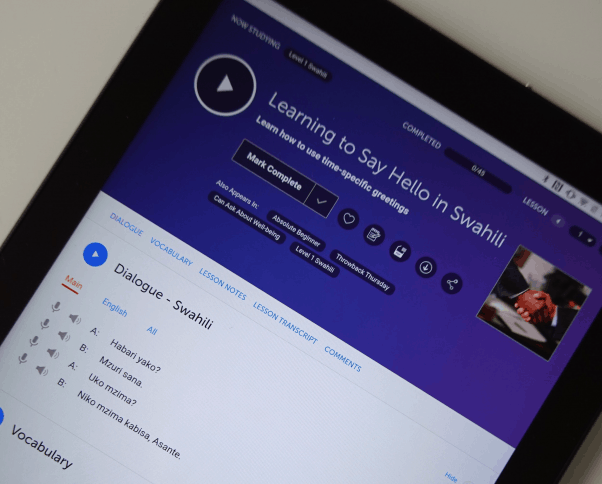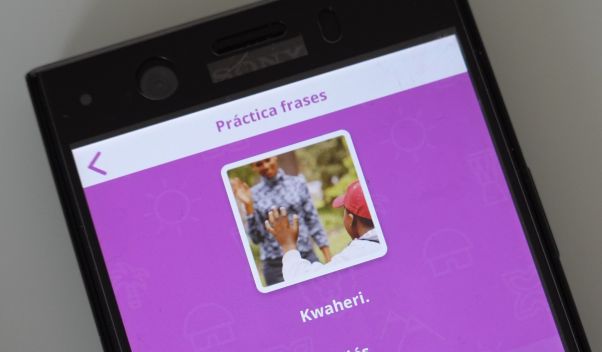Are you ready to dive into the rhythmic beats and vibrant culture of East Africa?
Swahili, known as the easiest African language to learn is the lingua franca in East Africa. It has the same alphabet as English and has no tonal features. Swahili is not just a language but a gateway to a diverse array of cultures spanning the African continent. Whatever your motivation for learning Swahili may be, there’s a resource for you.
To help you with your Swahili learning journey, we’ve spent hundreds of hours testing various Swahili resources. The best app depends on what fits your learning style and goal. For you to find that out, we’ve curated a list of the best apps, courses, classes, pronunciation guides, and more to help you find the best app to learn Swahili.
Table of Contents
Resources for Learning Swahili
Now we’ve talked about how to pick the right study methods and create a study plan, let’s look at the resources available for learning Swahili. There are plenty of options for you to choose from.
Online Swahili Classes and Language Exchanges
There’s nothing like working with a tutor or participating in a language exchange to improve your speaking and listening. Plus, you’ll get feedback on your errors and can learn more natural phrases than most textbooks and courses have to offer.
Swahili Classes Online
italki is the most well-known online teacher marketplace. It often has the widest selection of teachers and the lowest prices. While we’re not a fan of its payment processing options, we like its extra features: download the app to share your Swahili writing and audio recordings for critiques and corrections from the community.
Verbling has a small number of Swahili teachers. The teacher application seems to be slightly more rigorous than on italki, although you’ll still find unqualified tutors there. We also prefer Verbling’s online classroom and payment options. However, there’s no denying that you have fewer teachers to choose from.
If you like getting lots of feedback, you might like Verbal Planet’s system. You’ll get detailed reports after every class. However, they only have two Swahili teachers at the time of writing this article.
AmazingTalker has a small selection of Swahili teachers for you to choose from. Teachers undergo a selection process, and the lesson prices are relatively low.
Justlearn offers subscription-based Swahili classes, allowing you to sign up for two to six 25-minute classes a month. All tutors are verified and native speakers, although Justlearn doesn’t explain their recruitment process.
Apprentus also has a range of Swahili teachers. Some of them offer group classes and structured courses. You can also book classes for children and teenagers.
You might also find online teachers via local job boards and tutor marketplaces, such as the UK-based FirstTutors: Languages and the US-based Wyzant. When using a platform like this, pay attention to the terms and conditions; while some offer payment protection or review teachers’ qualifications, others don’t.

Learn to give opinions confidently in online Swahili classes.
Community Feedback
Sometimes, you don’t want a whole class. You just want a native speaker to explain an idiom or tell you if you’ve conjugated something correctly. That’s where community-feedback platforms come in handy.
With the HiNative app, you can post questions and help out other learners with their language-related queries. We find their points system rewarding and think it’s a good choice for just about any learner.
The WordReference forum doesn’t have a lot of Swahili content, but if you can’t get answers to your questions on HiNative or don’t fancy signing up for another app, it’s worth trying. After all, you never know who’s lurking. Alternatively, try the Swahili and Learn Swahili subs on Reddit, both dedicated to learning the language. The Swahili subreddit is more active.
Looking for feedback on your writing? We’ve already mentioned italki’s community features. You can also check out LangCorrect, although you might struggle to find many Swahili speakers there.
Language Exchanges
Ready to put your Swahili into practice? It’s time for a language exchange.
Ease yourself into it with a messaging app like Speaky (reviewed here), Tandem (reviewed here), or HelloTalk (reviewed here). The great thing about these apps is that it doesn’t matter if you live in rural Nebraska, the Faroe Islands, or the Australian Outback: you still have a chance to chat with a Swahili speaker.
Alternatively, look for an in-person language exchange. MeetUp has several Swahili groups in locations as diverse as Paris, Tokyo, and Mississauga in Canada. You can also set up your own group or go to a general language exchange where you might bump into another Swahili speaker (and if not, at least you’ll still be able to chat about language learning). Alternatively, try looking at Facebook groups and events.
Just remember to be sensibly cautious when meeting with strangers. Go to events in public places, don’t feel pressured to give out your contact details unless you want to, and leave if something feels off.

Making new friends at Swahili language exchanges.
Swahili Courses: Online, App-Based & Audio
You won’t find Swahili on Rosetta Stone, Babble, or Busuu, but there’s a surprisingly large number of courses to choose from.
Swahili Courses: Our Top Picks
SwahiliPod101 contains a plethora of video and audio courses. Some of them stand alone, while others build on each other. We think it can feel unstructured, but it’s great for listening practice and contains an incredible amount of lessons.
Mango Languages is targeted at beginner and lower-intermediate students and will quickly get you to make your own sentences. We think it’s effective and like the focus on pronunciation. You can record yourself speaking and then play the audio clip over a native speaker’s, allowing you to spot where your pronunciation or stress isn’t quite right.
Struggling with your grammar? Consider using the Language Transfer audio course as a supplementary resource. It focuses on helping you understand grammar so you can build your own sentences. We found the 110-lesson Swahili course unintimidating, relaxed, and encouraging. However, you jump straight in without covering essential information and there aren’t many exercises, so you’ll probably want to combine it with other resources.
Pimsleur is an audio course with thorough lessons and lots of drilling. It can be short on grammar, however, which can be particularly frustrating with a language like Swahili. Plus, the 30-minute lesson times can progress slowly. In many ways, it’s the opposite of Language Transfer – so you might find you like using them alongside each other.

Listening and vocabulary practice for beginners via SwahiliPod101.
Swahili Courses Like Duolingo
Our top pick for a gamified fun app has to be Ling. We think Ling is an entertaining Duolingo-esque app that’s well-suited to beginners. We like the native-speaker audio and speaking and writing features, none of which Duolingo has. It has been improving the user interface a lot, so we won’t be surprised if any challenges we’ve mentioned in our review has been resolved by the time you try it.
Duolingo’s Swahili course has a bad reputation, but it’s much better than it used to be. For example, they recently added audio. However, some users still complain about errors. And while Duolingo can be fun, there are other, similar apps out there.
Memrise doesn’t have any official Swahili courses, but there are several community-made ones that go from beginner to advanced. In our experience, Memrise can be a fun and effective way to learn vocabulary and grammar, but the quality of community-made courses can vary.
More Swahili Courses
Swahili Dar Language School has several video-based courses on its website. We haven’t been able to try them out, but you can get a taster of the teacher’s style on their YouTube channel.
OPLingo has over 100 Swahili listening comprehension activities. You can mark the new vocabulary to help you keep track of them. They also have some impressive extra features, including the ability to import your own Swahili texts and look up vocabulary. If you sign up for a paid membership, the profits are used to fund social impact initiatives, including building a school in Tanzania.

The right online course makes studying Swahili fun.
For lower intermediate students, Glossika will get you picking up Swahili through the heavy repetition of phrases. We think it’s similar to Pimsleur, although the quality doesn’t seem quite as high. In particular, we felt the exercises were poorly thought out, and it could be buggy.
Global Language Online Support System has an assortment of Swahili exercises and lessons. They don’t logically build on from each other, but they can be a good way to add some variety to your language studies. Don’t forget to click the instructions button in the upper right-hand corner if you’re unsure about what to do.
Looking for something for young children? Dino Lingo will teach them Swahili through videos and games. Although we’re not convinced by all the videos, it’s a fun option for little learners.
The 29-lesson Teach Yourself Swahili CD course from S L & C Swahili Language & Culture may not run on modern operating systems. However, you can access a PDF version of the course for free here. It contains grammar breakdowns and an extensive amount of vocabulary, although you’re probably best using it with a teacher (or the CD, if you’re willing to risk buying something that might not work on your computer). If you do buy the CD, all proceeds go to the Texas-based non-profit Msaada Educational Foundation.
The Learn Swahili app from Samba Kamara/Linguarena is best used alongside a flashcard app or even another course. We think it lacks sufficient exercises and drills. However, we like the native audio and cultural information, as well as the wide range of phrases it teaches.
Many of the links on Kiswahili Web at UPenn will take you to 404 pages, but you can still find some exercises. For example, there are fill-in-the-blank activities based on audio clips here and more listening exercises here. Bear in mind that you need to download the audio to your computer.
You’ll also find Swahili courses on the course marketplace Udemy. Make sure to read the syllabus and reviews before purchasing, however: since Udemy is just a marketplace, the quality and content can vary greatly. You’re probably best off waiting for a sale, too.

Study Swahili courses at home with your laptop or on the go with your phone.
Swahili Language Courses You Should (Probably) Avoid
A bad language course won’t just waste your time or money. It can teach you incorrect Swahili, or perhaps even worse, leave you demotivated and lacking confidence. And so we can’t recommend these courses:
10 years ago, Instant Immersion probably wasn’t a bad option. It comes with MP3 files, computer software, and workbooks. Yet we don’t believe it’s stood the test of time. There are better options available, especially given that prices start at $34.95.
Bluebird Languages has lots of videos and we like the native audio. However, when using it for under-resourced languages, we came across a lot of fundamental errors. If you’re tempted by it, we would ask a teacher to check it first.
We found the Living Language course ineffective, poorly structured, and a bad use of time. As we worked our way through it, we felt we learned more about how to game the system than how to speak the language.
You’ll find Complete Language Lessons’ audio course Learn Swahili Easily, Effectively, and Fluently on Amazon, Spotify, and Deezer. The audio quality isn’t great, but that’s the least of the issues with this CD. It seems to consist of Swahili phrases repeated over and over again, without translations or explanations, and with occasional muted club music in the background. We wondered if it was supposed to accompany a textbook, but we couldn’t find one.
In our experience, 17 Minute Languages is dull, lacks explanations and is full of errors. The only thing we liked was the native-speaker audio – but there are plenty of better courses offering that.
As for Transparent Language, it’s well-designed but we don’t believe you’ll be able to speak Swahili after using it. That’s because it doesn’t teach you grammar or sentence structure. Plus, it’s relatively expensive.
Meanwhile, Cudoo left us confused, bored, and unable to say pretty much anything. It felt to us like someone took a word list, turned it into a PowerPoint presentation, and then put it up for sale. Complete beginners are asked to learn 14-word phrases by rote for pretty specific situations, such as “Could you ask him to call me back? My number is 291377” – and there is no breakdown of what the individual words mean.

Some Swahili courses are less effective than others.
Swahili Phrasebooks, Vocabulary Builders, and Word Games
If you’ve ever found yourself at a street stall ordering samosas yet again, all because you don’t know the names of the other types of food, you need a word-builder app. Your language course or textbook will teach you some vocabulary, but it’s rarely enough to get by when in East Africa. Try some of these options out:
Our Top Picks
Hoping to learn Swahili ahead of a vacation or business trip? uTalk could be a good option. This app will teach you words and phrases on 69 different themes, from going shopping and eating in a restaurant to disaster relief volunteering and soccer games. We like the native audio, although if you’re a perfectionist, this might not be the app for you – it’s surprisingly hard to get 100% on some of the drills and exercises.
We like both Vocly (review) and Simply Learn (review), which teach you words or phrases respectively. These apps were made by the same developer who is behind Ling, the Duolingo-esque course we mentioned earlier. If you’re looking to learn Swahili and want to expand your vocabulary, you could try Vocly alongside a course. If you’re just going for a short trip, give Simply Learn a go.

Studying Swahili via uTalk, which teaches Swahili phrases through several languages including Lingala, Zulu, Wolof, Xhosa, English, and Spanish.
Personalized or Make-Your-Own Flashcard Sets
Whether you’re coming across new Swahili words in your independent reading or simply want help remembering the vocabulary in your textbook, sometimes the best flashcards are the ones you create yourself.
If you learn best by doing, you might find you prefer to make pen-and-paper flashcards. However, apps will allow you to add audio recordings to them, plus you won’t have to carry a large bundle of them in your pocket or purse.
We think Anki is one of the best language-learning apps for any learner and any language. It allows you to make your own flashcard decks or use one of the shared community-made ones. You’ve got plenty of choices for Swahili. One of our favorite things about Anki is how it adapts: words that you find more difficult will come up more frequently.
Brainscape is an Anki competitor. Although we think it has a more modern interface, there’s not much difference between the two apps.
If you’re reading online in Swahili, Readlang could make it a lot easier. You can use it to translate new words, and it will add the most common ones to flashcard decks for you. We like that the flashcard automatically contains the sentence in which you first discovered the word, helping you to understand the context and grammar.

Buying fruit at a Tanzanian market. Credit: David Cashbaugh
More Vocabulary Apps and Games
The freemium app Learn Swahili Free by Innovation Apps boasts of teaching you 9,000 words and phrases. We like how you can record your own voice and listen back to it. However, you can’t drill the new vocabulary within the app.
The Internet Polyglot website has over 40 themed Swahili-English word lists. Each entry has an audio recording, and there are several different games you can play to test your memory of the new vocabulary.
Daily Swahili from Belas Mobile will teach you a new word, phrase, and proverb every day, or you can go to Categories to view the entire list. You can also add words to Favourites or view your history. There’s no option for drilling new vocabulary, and the native audio sounded garbled when we tried it, so we’d use this alongside Anki and Forvo (review).
Beginner Swahili learners can use the Digital Dialects website to memorize colors, numbers, food, and calendar-based vocabulary. It has games that will test your memory, but take care not to mistake any of the ads with their big Play buttons for a game.

Lunch time in Nairobi. Credit: Nelly Jeroben
Fed up with apps that all look the same? In Swahili Bubble Bath, you have to match the Swahili word in the bubble to one of two English words. The game continues until you make five mistakes, and there are over 60 topics to choose from. We think it’s a fun way to memorize words, but unless you’ve already studied the vocabulary, we doubt you’ll learn many new words: it’s just too overwhelming. Use it as a supplementary resource alongside a course, textbook, or even another app.
You’ll also find several word lists on Kiswahili.net and PBS. Kiswahili.net also has some cultural notes.
LingoHut’s website contains an impressive 125 themed word lists for Swahili. That said, there aren’t many ways to drill the new words and phrases, and we have some doubts about the usefulness of some of the language.
Lingua Boosts’ Learn Conversational Swahili series bills itself as an audio course, but it actually just teaches you phrases. We like that everything’s taught in context, but some of the phrases are so context-specific that we wonder how useful they really are. Take “I lived in Paris when I was 10 years old” (lesson four). Without knowing how to say “when I was 10 years old,” it’s impossible to alter the phrase – meaning you can only use it if you really did happen to live in Paris when you were 10 years old.
Swahili Classes for Foreigners is a very old blog, and much of the content has been deleted. However, you can still find some posts with useful word lists.
Use These Apps With Caution – If at All
The Learn Swahili app by Language Corner contains word lists and audio recordings for a limited range of basic words. However, we found it too buggy to use. After the first ad popped up, all the audio recordings stopped working.
You’ll also find Swahili word lists on the websites Learn101, Polymath, ilanguages, ilovelanguages, and MyLanguages. However, we would be wary of all of these: generally speaking, we find them unstructured and at times confusing. Users of MyLanguages, in particular, have complained about lots of errors.

Shopping at the market in Lamu, Kenya. Credit: Photos By Beks
Online Swahili Grammar Guides and Exercises
Most courses and textbooks will teach you grammar, but sometimes, you need to spend a bit more time on verb conjugation or syntax.
Verbix will help you double-check your verb conjugation, providing you know the infinitive, and sometimes it will even show you example sentences.
You’ll find lots of blog posts breaking down Swahili grammar on 2Seeds Swahili. There are also worksheets and answer sheets to help you practice the new material. We think the posts are well organized and build on each other. Try Introduction to Noun Classes to brush up on one of the most challenging grammatical aspects of Swahili.
You might come across LinguaShop.com, which advertises free PDF sheets with exercises sent to your email address. When we signed up, though, we didn’t receive them.
Swahili Pronunciation Guides
One of the great things about learning Swahili is that it uses phonetic spelling. Once you know the pronunciation rules, you’ll be able to say any word just by looking at it. This is pretty different from English, where “through” is pronounced like “threw” instead of “rough.”
Yet even so, you might find yourself wanting to drill pronunciation, especially as you begin your studies. KIKO has a pronunciation breakdown along with audio clips. There’s also a grammar guide, although we think it’s too superficial to really be useful.
You could also try Vocabulearn’s 4-disc Swahili/English Level 1 course (Amazon, Spotify). Each track introduces you to a long list of Swahili words and phrases. We don’t feel that you’ll learn Swahili from it, as there are no grammar explanations, exercises, or drills. However, since each word is said slowly and clearly, you could use it for pronunciation practice.
Want to look up the pronunciation of a specific word? We’re huge fans of Forvo. It has community-uploaded voice recordings for millions of words.

Pronunciation practice on the go.
Learning Swahili via YouTube
If you’re more of an audiovisual learner, or simply looking for something with native-speaker audio to supplement a textbook, then you might like YouTube videos. They tend to be lower quality than courses, apps, and textbooks – but they are, of course, free. Here are some channels and playlists to start you off:
Zero to Hero isn’t a YouTube channel but a website. However, it has embedded Swahili-language YouTube videos with Closed Captioning and added their transcript to the side of the videos. In their words, it’s like FluentU but free and for a wider range of languages (and, we have to add, without the quizzes). FluentU only has content in nine languages, none of which are Swahili.
We’ve already mentioned SwahiliPod101 under Swahili language courses. They also have a YouTube channel with playlists such as Swahili in 3 Minutes, Swahili Reading Practice for Beginners, and Swahili Listening Practice.
Learn Swahili Easily has a fair number of vocabulary-based lessons for beginners. The instruction is clear, and most videos are around one to two minutes long.
Easy Swahili will teach you basic Swahili phrases. They don’t have many videos, but each one is short and sweet and with clear audio. They also include some Swahili slang. Intermediate Swahili learners might also like this Swahili-language interview about Valentine’s Day in Kenya. In our opinion, the biggest benefit of these videos, whether beginner or intermediate, is the variety of native Swahili speakers that you’ll get to listen to.
Swahili101 has plenty of Swahili videos for you to watch. We like the cultural information that the host, KulManSam, includes.
For something more technical, and with plenty of grammar-based instruction, try Swahili Dar Language School’s channel. They have videos for beginner- and intermediate-level learners alike. Make yourself a cup of coffee and get comfy before pressing play: their videos range from 12 to 50 minutes in length.
Swahili Centre has a range of beginner-level video lessons. Their video Swahili Sentence Construction could be particularly useful if you’re struggling with grammar.
Swahili Stadia has a very small number of videos targeted at intermediate-level learners.
Education World has turned a 300-phrase vocabulary list into an hour-long YouTube video. We’re not sure it’s the most effective or engaging video, so it’s probably best to only watch small amounts at a time.
Swahili AniBooks by BookBox is designed to help children learn Swahili through subtitled YouTube videos. They can be just as useful for adults as kids, though.
Swahili Fairy Tales also has Swahili-language stories with subtitles.

Practice with a partner can be even more effective.
Swahili Podcasts
With podcasts, you can simultaneously challenge your Swahili listening skills while learning more about the topics that interest you. Plus, you can do it while commuting, cooking, and more.
The most organized and robust among all possible podcasts is probably SwahiliPod101. It has a ton of free stuff, and its premium versions are well structured and one version gives you access to a personal tutor! It has a handy Swahili level test which we liked.
Looking for something that will teach you Swahili? The newly launched Swahili with Mariana has just a few episodes at the time of publication, but hopefully, we’ll see more published.
In Kenyan Plug, Kenyan American Shiro speaks Swahili imperfectly but, as she says, passionately. The topics range from politics to culture.
Africa & Beyond is in both English and Swahili. At 7–35 minutes per episode, it’s easy to find one short or long enough for your liking.
For Swahili-speaking Australians, SBS Swahili explores news and politics and is updated multiple times a week. Meanwhile, if you’re in Japan, NHK World Kiswahili is updated daily.

Choose a podcast that will make you laugh or think.

